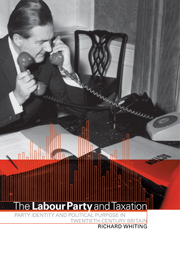Book contents
- Frontmatter
- Contents
- List of tables
- Acknowledgements
- List of abbreviations
- Introduction: Taxation and political debate
- 1 Struggles within a liberal inheritance, 1906–1940
- 2 The changing balance of tax interests, 1940–1954
- 3 The Kaldor era, 1951–1965
- 4 Social democracy examined, 1965–1970
- 5 Defensive positions, 1970–1979
- 6 Epilogue: New Labour, old problems?
- 7 Conclusion
- Select bibliography
- Index
3 - The Kaldor era, 1951–1965
Published online by Cambridge University Press: 07 August 2009
- Frontmatter
- Contents
- List of tables
- Acknowledgements
- List of abbreviations
- Introduction: Taxation and political debate
- 1 Struggles within a liberal inheritance, 1906–1940
- 2 The changing balance of tax interests, 1940–1954
- 3 The Kaldor era, 1951–1965
- 4 Social democracy examined, 1965–1970
- 5 Defensive positions, 1970–1979
- 6 Epilogue: New Labour, old problems?
- 7 Conclusion
- Select bibliography
- Index
Summary
During the period 1951–65 Labour had a clear picture of the kind of tax reforms it wished to undertake. For the first time Labour was not dealing with inheritances from Liberals and the First World War or the egalitarian impulse of the Second but, rather, with developments that had emerged under the Attlee governments. This effort, which culminated in the 1965 Finance Act, required considerable political and intellectual energy for its fulfilment. But, as subsequent chapters will show, it left a radical agenda still unfulfilled and showed little sign of meeting challenges to reform the tax system more broadly.
Labour's priorities for the 1950s were set out by Gaitskell in an article he wrote for The Political Quarterly which was published in 1953. The fundamental goal was the achievement of ‘social justice, equality, the classless society – call it what you will’. While he recognized some scope for further nationalization, it was not at the centre of his programme. There would always be parts of the economy, he argued, which should be left in private hands; there might be practical problems limiting the extent of nationalization, in particular a possible shortage of competent managers; if compensation were to be paid to private owners, state ownership would only slowly deliver greater equality. In place of nationalization, Gaitskell identified three areas where equality might be advanced, and two were intimately connected with taxation: tackling the abuse of expense allowances to avoid tax; education; and a better distribution of unearned income and the property from which it was derived.
- Type
- Chapter
- Information
- The Labour Party and TaxationParty Identity and Political Purpose in Twentieth-Century Britain, pp. 130 - 172Publisher: Cambridge University PressPrint publication year: 2001



